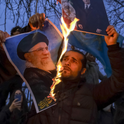Soaring expectations: women walk in Kasbah Square in the capital Tunis after the “relatively mild revolution” which ousted President Ben Ali
Tunis is oddly calm and normal for the capital of a country that has just triggered the greatest upheaval in the Arab world since the end of the first world war. Nor would you guess from the current provisional government that the revolution was driven by frustrated young people using the latest networking technologies; the combined ages of the new Tunisian president and prime minister is 161 years. But the two old men are bridging the generation gap and, for now, keeping the show on the road.
The attention of the world has of course moved elsewhere since Tunisia, much to its own amazement, lit the torch at the end of December. But on a recent trip to Tunis I discovered that the Tunisians have not been idle since the president of 23 years, Ben Ali, fled the country on 14th January.
They are now on to their third government, having got rid of Ben Ali’s unpopular prime minister, Mohamed Ghannouchi, at the end of February. The new prime minister, 84-year-old Beji Caid Essebsi, a veteran of the 1950s independence movement and largely untainted by the Ben Ali regime, announced elections on 24th July for an assembly to draw up a new constitution.
From not having had a proper election, ever, Tunisia is poised to have three in quick succession—culminating with elections for a new president and parliament, perhaps at the end of the year. This modest former French colony could now set the pattern for the next, trickier stage of Arab democratic reform. “We can be the test-bed for the whole Arab world, but we must not rush,” says Raoudha Ben Othman, professor of linguistics at Tunis University.
The dilemma for Tunisia—and Egypt too—is that if it moves too fast to elections, new parties and leaders will not have time to find their voice. But if it moves too slowly, activists will become impatient, perhaps violently so. On top of that, Tunisia has to invent a democratic culture—to replace what Ben Othman calls the “allegiance culture”—as well as a free media, a new judiciary, a new party system, and work out how to deal with the legacy of the old regime. Facebook can’t help much there, even if 18 per cent of the population use the site (and more than a third are online).
But if any Arab nation can pull this off, it ought to be Tunisia. Of the 10m people, 42 per cent are under 25. But it is ethnically and religiously homogeneous, and famously stable—a sort of Slovenia of north Africa, where even the Islamists are not very radical. It has a GDP per capita of £5,900 a year, despite no mineral wealth, and has decent infrastructure. Its brightest and best were channelled into business to keep them out of politics—and it was only in recent years, when the ruling Ben Ali family grabbed chunks of privatised businesses, that the private-public divide became more blurred. Above all, it has a well-educated population, spending about 7 per cent of GDP on education. Perhaps as a result, women have more rights than almost anywhere else in the Arab world.
Also, although about 240 people have died so far, the revolution has been swift and clean. The Ben Ali clan has gone, along with a few big figures in government and the military, which is tiny and unpolitical. There has been some rapid repositioning by members of the power elite, but there seems to be little sense of retribution in the air. That said, one man from the south I met talked bitterly about the policeman who always ate free at his local cafe. Such petty abuses can build into big hatreds.
While the ousted regime was certainly repressive, Ben Ali himself—although not his family—had some popular support right to the end. The jails were not full of political prisoners and violence was seldom needed—most people knew the rules and usually abided by them. “There was a lot of self-censorship, as well as real censorship,” admits Essia Atrous, a leading journalist with the newspaper Assabah. About 20 per cent of the population were members of the ruling RCD party (now dissolved).
So, by regional standards, a relatively mild dictatorship has been overthrown by a mild revolution. When I visited Kasbah Square in central Tunis, at the end of February, a few hundred hardcore protesters remained camped outside the office of the then prime minister. It was part-carnival, part-seminar, with earnest discussion of human rights and the separation of powers. I was with a few young, western-educated Tunisians who were surprised to find the protesters so well informed. There was a sense of fun, too: “Thank you Facebook” read one piece of graffiti in English. I was given a CD of revolutionary rap songs. One mocks Ben Ali, whose gruff-voiced speeches form the background to the track.
It is not, however, a foregone conclusion that Tunisia will successfully set the democratic template. The constituent assembly announcement was well received and has relegitimised the provisional government. The new prime minister, Essebsi, is popular partly because he is so old, which means he won’t hang around beyond his five-month term, and also because he has consulted so conscientiously with everyone from the communists to the Islamists—and has scrapped the hated political police.
For now, the country is diverted by the Libya refugee crisis, but the longer-term worry is economic dislocation and soaring expectations. The revolution set off a wave of strikes for higher pay—including one at the hotel in Tunis where I was staying. “Lots of workers felt that the revolution entitled them to 20 per cent pay rises and there’s no authority to stop them,” says Fares Mabrouk, who is founding Tunis’s first political think tank. Moreover, the main union federation (the UGTT) is starting to throw its weight around politically. Coming on top of a drop in tourism and inward investment, that will not help cut unemployment, which could be as high as 30 per cent among the country’s youth and was one of the triggers of the revolt. Mohamed Bouazizi, whose horrific self-immolation started the street protests, was a market trader blocked from doing his job.
And what about the Islamic radicals? There have been demonstrations outside the Tunis synagogue and some brothels have been closed; in both cases the more radical Islamist party, Hizb ut-Tahrir, seems to have been involved. Yet the bigger Islamist party, Ennahdha, led by Rachid Ghannouchi (no relation of the ex-prime minister), is pledged to democracy and gender equality—although some educated women fear the worst. “I don’t trust them an inch,” says journalist Essia Atrous.
But the underlying optimism of the revolution was on show at the country’s first free political debate, on 22nd February in Tunis. Tim Sebastian, the former BBC reporter, chaired a debate on the motion that “This house believes that Arab revolutions will just produce different dictators” which was later broadcast in the “Doha debates” series on BBC World News.
Opposing the motion, Shibley Telhami, a Palestinian-American academic, described what had happened in Tunisia as “Bin Laden’s nightmare.” I asked him later what he thought had caused the revolution. “It’s the information revolution… governments have been robbed of a monopoly of information, they cannot ignore their publics any more because they have other sources of information and can also organise through these new channels,” he said.
Fares Mabrouk, who was also opposing the motion (which was roundly defeated), put it another way. “There were many factors here, short-term ones like unemployment, the WikiLeaks story [showing that the US was turning against the regime] and the fact that Ben Ali was planning to stay on beyond 2014, and longer term ones like our education levels and the internet.” But the biggest cause of all, he said, was that while Tunisia ranked in the top half of the global table for economic development, its society was still one of the most closed.
What next? “The model may be something like Turkey,” says Mabrouk, “but it will take us at least five years to develop a democratic culture and a civil society in which people can see themselves reflected.”
Tunis is oddly calm and normal for the capital of a country that has just triggered the greatest upheaval in the Arab world since the end of the first world war. Nor would you guess from the current provisional government that the revolution was driven by frustrated young people using the latest networking technologies; the combined ages of the new Tunisian president and prime minister is 161 years. But the two old men are bridging the generation gap and, for now, keeping the show on the road.
The attention of the world has of course moved elsewhere since Tunisia, much to its own amazement, lit the torch at the end of December. But on a recent trip to Tunis I discovered that the Tunisians have not been idle since the president of 23 years, Ben Ali, fled the country on 14th January.
They are now on to their third government, having got rid of Ben Ali’s unpopular prime minister, Mohamed Ghannouchi, at the end of February. The new prime minister, 84-year-old Beji Caid Essebsi, a veteran of the 1950s independence movement and largely untainted by the Ben Ali regime, announced elections on 24th July for an assembly to draw up a new constitution.
From not having had a proper election, ever, Tunisia is poised to have three in quick succession—culminating with elections for a new president and parliament, perhaps at the end of the year. This modest former French colony could now set the pattern for the next, trickier stage of Arab democratic reform. “We can be the test-bed for the whole Arab world, but we must not rush,” says Raoudha Ben Othman, professor of linguistics at Tunis University.
The dilemma for Tunisia—and Egypt too—is that if it moves too fast to elections, new parties and leaders will not have time to find their voice. But if it moves too slowly, activists will become impatient, perhaps violently so. On top of that, Tunisia has to invent a democratic culture—to replace what Ben Othman calls the “allegiance culture”—as well as a free media, a new judiciary, a new party system, and work out how to deal with the legacy of the old regime. Facebook can’t help much there, even if 18 per cent of the population use the site (and more than a third are online).
But if any Arab nation can pull this off, it ought to be Tunisia. Of the 10m people, 42 per cent are under 25. But it is ethnically and religiously homogeneous, and famously stable—a sort of Slovenia of north Africa, where even the Islamists are not very radical. It has a GDP per capita of £5,900 a year, despite no mineral wealth, and has decent infrastructure. Its brightest and best were channelled into business to keep them out of politics—and it was only in recent years, when the ruling Ben Ali family grabbed chunks of privatised businesses, that the private-public divide became more blurred. Above all, it has a well-educated population, spending about 7 per cent of GDP on education. Perhaps as a result, women have more rights than almost anywhere else in the Arab world.
Also, although about 240 people have died so far, the revolution has been swift and clean. The Ben Ali clan has gone, along with a few big figures in government and the military, which is tiny and unpolitical. There has been some rapid repositioning by members of the power elite, but there seems to be little sense of retribution in the air. That said, one man from the south I met talked bitterly about the policeman who always ate free at his local cafe. Such petty abuses can build into big hatreds.
While the ousted regime was certainly repressive, Ben Ali himself—although not his family—had some popular support right to the end. The jails were not full of political prisoners and violence was seldom needed—most people knew the rules and usually abided by them. “There was a lot of self-censorship, as well as real censorship,” admits Essia Atrous, a leading journalist with the newspaper Assabah. About 20 per cent of the population were members of the ruling RCD party (now dissolved).
So, by regional standards, a relatively mild dictatorship has been overthrown by a mild revolution. When I visited Kasbah Square in central Tunis, at the end of February, a few hundred hardcore protesters remained camped outside the office of the then prime minister. It was part-carnival, part-seminar, with earnest discussion of human rights and the separation of powers. I was with a few young, western-educated Tunisians who were surprised to find the protesters so well informed. There was a sense of fun, too: “Thank you Facebook” read one piece of graffiti in English. I was given a CD of revolutionary rap songs. One mocks Ben Ali, whose gruff-voiced speeches form the background to the track.
It is not, however, a foregone conclusion that Tunisia will successfully set the democratic template. The constituent assembly announcement was well received and has relegitimised the provisional government. The new prime minister, Essebsi, is popular partly because he is so old, which means he won’t hang around beyond his five-month term, and also because he has consulted so conscientiously with everyone from the communists to the Islamists—and has scrapped the hated political police.
For now, the country is diverted by the Libya refugee crisis, but the longer-term worry is economic dislocation and soaring expectations. The revolution set off a wave of strikes for higher pay—including one at the hotel in Tunis where I was staying. “Lots of workers felt that the revolution entitled them to 20 per cent pay rises and there’s no authority to stop them,” says Fares Mabrouk, who is founding Tunis’s first political think tank. Moreover, the main union federation (the UGTT) is starting to throw its weight around politically. Coming on top of a drop in tourism and inward investment, that will not help cut unemployment, which could be as high as 30 per cent among the country’s youth and was one of the triggers of the revolt. Mohamed Bouazizi, whose horrific self-immolation started the street protests, was a market trader blocked from doing his job.
And what about the Islamic radicals? There have been demonstrations outside the Tunis synagogue and some brothels have been closed; in both cases the more radical Islamist party, Hizb ut-Tahrir, seems to have been involved. Yet the bigger Islamist party, Ennahdha, led by Rachid Ghannouchi (no relation of the ex-prime minister), is pledged to democracy and gender equality—although some educated women fear the worst. “I don’t trust them an inch,” says journalist Essia Atrous.
But the underlying optimism of the revolution was on show at the country’s first free political debate, on 22nd February in Tunis. Tim Sebastian, the former BBC reporter, chaired a debate on the motion that “This house believes that Arab revolutions will just produce different dictators” which was later broadcast in the “Doha debates” series on BBC World News.
Opposing the motion, Shibley Telhami, a Palestinian-American academic, described what had happened in Tunisia as “Bin Laden’s nightmare.” I asked him later what he thought had caused the revolution. “It’s the information revolution… governments have been robbed of a monopoly of information, they cannot ignore their publics any more because they have other sources of information and can also organise through these new channels,” he said.
Fares Mabrouk, who was also opposing the motion (which was roundly defeated), put it another way. “There were many factors here, short-term ones like unemployment, the WikiLeaks story [showing that the US was turning against the regime] and the fact that Ben Ali was planning to stay on beyond 2014, and longer term ones like our education levels and the internet.” But the biggest cause of all, he said, was that while Tunisia ranked in the top half of the global table for economic development, its society was still one of the most closed.
What next? “The model may be something like Turkey,” says Mabrouk, “but it will take us at least five years to develop a democratic culture and a civil society in which people can see themselves reflected.”












